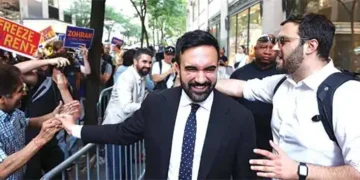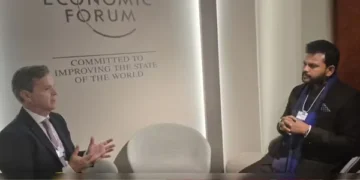Blitz Bureau
THERE is a distinct whiff of the late sixties in the air of America. A hard-right ideologue in the White House who believes that a military hammer is complementary to the peace process, while the campus is aflame with passionate support for a perceived victim of war. It was Richard Nixon and Vietnam then; it is Donald Trump and Gaza now.
Parallels are rarely equivalent; they cannot be because both the history and geography of conflict are different. Nor does Trump have a Henry Kissinger by his side, for prayer (occasional), persuasion (frequent), and diplomacy (persistent), but then Trump is also his own Kissinger. The mirror is more accurate when reflecting street rage, which has crossed the Atlantic into Europe. Israel may be shocked when it eventually calculates the long-term damage to credibility from visceral images of elderly Gazans being blown up as they scrounge for food and helpless children dying in thousands.
The world was with Israel when Hamas inflicted terrible, unforgiveable death on an Israeli music festival. Now, Britain’s most popular music event, Glastonbury, resonates with chants of ‘Death to IDF’ and star performers globalise the Palestine intifada while British authorities wonder how this footage slipped into BBC coverage.
A complete outsider Governments cannot remain immune from the street in a democracy. Ireland has banned imports from Israel; Spain and South Africa have voiced outrage. In New York, a complete outsider wins the Democratic Party primary and becomes favourite in the election for the world’s most powerful mayor despite praising the Palestine intifada.
That is not the principal reason why Zohran Mamdani defeated a prince of the Democratic establishment, Andrew Cuomo. Mamdani wants to tax billionaires and millionaires to fund a minimum wage of $30 per hour, universal childcare, free buses and freeze rent.
But he also wants to arrest Benjamin Netanyahu should the current Israeli Prime Minister set foot in the city. Donald Trump, never one to settle for spoken when one can be outspoken, has castigated Mamdani as a communist lunatic and threatened to cut $100 billion in federal funds to the city if Mamdani practises what he preaches. Mamdani avers that his inspiration is Reverend Martin Luther King. The loop to the late Sixties is complete.
From Maharaja to a lachrymose crocodile Time, then, to change Air India’s logo from a Maharaja with a courteous back to a lachrymose crocodile. Most of us have never been privileged enough to see a crocodile cry but we could hardly miss the energetic display of such tears from Air India’s Chief Executive Campbell Wilson after the tragic crash in Ahmedabad on June 12.
He took about a week to convert those tears into a letter to members of Air India’s Maharaja Club. Nothing reveals insincerity more than the plagiarism. According to reports, nearly half of that statement was cut and pasted from the reaction of American Airlines CEO Robert Isom after the death of 67 people when a commercial jet collided with a military helicopter near Washington DC.
Accidents are tragic. No executive, chief or not, wants an accident. The tears are false because the service and management of Air India, once the pride of the nation, have been in constant decline and disarray, and little has improved since the airline was returned to private management. Air India was the beloved child of a true genius, JRD Tata. I met JRD just once. It was a high privilege. He was a hero of India. JRD’s memory remains iridescent but his legacy is under severe strain.
(T HERE is a distinct whiff of the late sixties in the air of America. A hard-right ideologue in the White House who believes that a military hammer is complementary to the peace process, while the campus is aflame with passionate support for a perceived victim of war. It was Richard Nixon and Vietnam then; it is Donald Trump and Gaza now.
Parallels are rarely equivalent; they cannot be because both the history and geography of conflict are different. Nor does Trump have a Henry Kissinger by his side, for prayer (occasional), persuasion (frequent), and diplomacy (persistent), but then Trump is also his own Kissinger.
The mirror is more accurate when reflecting street rage, which has crossed the Atlantic into Europe. Israel may be shocked when it eventually calculates the long-term damage to credibility from visceral images of elderly Gazans being blown up as they scrounge for food and helpless children dying in thousands.
The world was with Israel when Hamas inflicted terrible, unforgiveable death on an Israeli music festival. Now, Britain’s most popular music event, Glastonbury, resonates with chants of ‘Death to IDF’ and star performers globalise the Palestine intifada while British authorities wonder how this footage slipped into BBC coverage.
A complete outsider
Governments cannot remain immune from the street in a democracy. Ireland has banned imports from Israel; Spain and South Africa have voiced outrage. In New York, a complete outsider wins the Democratic Party primary and becomes favourite in the election for the world’s most powerful mayor despite praising the Palestine intifada.
That is not the principal reason why Zohran Mamdani defeated a prince of the Democratic establishment, Andrew Cuomo. Mamdani wants to tax billionaires and millionaires to fund a minimum wage of $30 per hour, universal childcare, free buses and freeze rent. But he also wants to arrest Benjamin Netanyahu should the current Israeli Prime Minister set foot in the city. Donald Trump, never one to settle for spoken when one can be outspoken, has castigated Mamdani as a communist lunatic and threatened to cut $100 billion in federal funds to the city if Mamdani practises what he preaches. Mamdani avers that his inspiration is Reverend Martin Luther King. The loop to the late Sixties is complete.
From Maharaja to a lachrymose crocodile
Time, then, to change Air India’s logo from a Maharaja with a courteous back to a lachrymose crocodile. Most of us have never been privileged enough to see a crocodile cry but we could hardly miss the energetic display of such tears from Air India’s Chief Executive Campbell Wilson after the tragic crash in Ahmedabad on June 12.
He took about a week to convert those tears into a letter to members of Air India’s Maharaja Club. Nothing reveals insincerity more than the plagiarism. According to reports, nearly half of that statement was cut and pasted from the reaction of American Airlines CEO Robert Isom after the death of 67 people when a commercial jet collided with a military helicopter near Washington DC. Accidents are tragic. No executive, chief or not, wants an accident. The tears are false because the service and management of Air India, once the pride of the nation, have been in constant decline and disarray, and little has improved since the airline was returned to private management. Air India was the beloved child of a true genius, JRD Tata. I met JRD just once. It was a high privilege. He was a hero of India. JRD’s memory remains iridescent but his legacy is under severe strain.

































